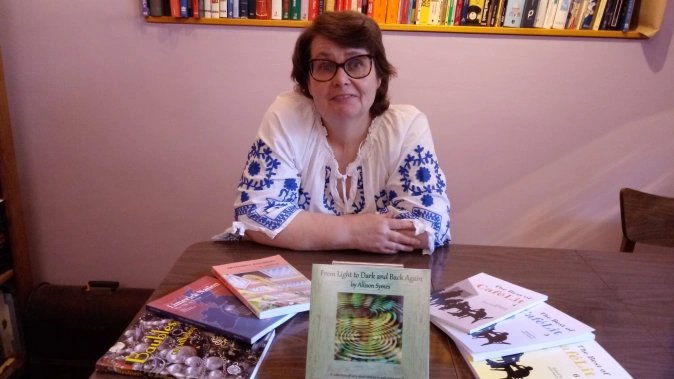Facebook – General
This post comes almost live from the Winchester Writers’ Festival. What do you mean by almost, I hear you cry? Well I started drafting this on Evernote just after a fab lunch with the lovely Val Penny (writer of the Edinburgh Crime Mysteries starring DI Hunter Wilson). I swear we stuck to orange juice… whether you believe me is another matter!
So what do I find most useful about coming to Winchester? Difficult to know where to start but here goes.
Information from the courses. You find out information you knew you needed and equally things you hadn’t known you needed to know. Both are useful.
Networking with writer friends, old and new.
The opportunity to hear first hand from published authors, agents, editors, and publishers in keynote speeches and the like. These can be real eye openers.
Coming to events like this can be a confidence booster especially when starting your own writing journey. You start to feel as if you are a real writer. Rejections can knock you back. Events like this help pick you up again.
Already looking forward to next year’s Festival.

Crime writer Val Penny and I having a selfie moment at the Winchester Writers’ Festival
Amongst the Murphy’s Laws that exist purely for writers must be the following:-
1. Time drags until it is time to write, then it flies by, leaving you wondering where on earth it went. Naturally you have not achieved as much as you would have liked either.
Incidentally that is okay. The big thing to ask yourself here is have you made progress on what you’re writing? Progress can include getting a certain number of words down, of course, but equally valid are things like changing scene orders, re-reading through, and being happy with how you’ve changed things. That all takes time but is as much writing as actual writing, if you see my meaning.
Don’t belittle yourself if “all” you managed to get done was some editing. As long as that editing is tightening up your work, improving it etc., it is a valid part of your writing and you are still making progress.
2. You may be a writer but you are still afflicted by the curse that says you can’t find a pen when you need one.
In public, this is embarrassing. Guess who, whenever she is due out at an event, makes absolutely sure she has pens in bags, pockets etc so she knows she has at least TWO on her person. It has to be two to prevent Murphy’s Law kicking in again by ensuring your solitary pen doesn’t work and if you only take one, it WILL fail on you.
3. Your toner cartridge runs out part way through a print run. It is never anywhere useful such as on the test print you do before you run out a lengthy story.
I use a laser jet so I have no indication of when it’s going to run out. Having said that, my lovely printer, which I call Old Faithful because I’ve had it for YEARS, has seen come and go at least three “cleverer” printers my better half has had, which DO say when their cartridges will run out, print in colour etc. On balance, I think I’ll stick with Old Faithful until it finally bites the dust.
There are similarities to writing and trying to lose weight.
1. You can be guaranteed frustrations along the way but it is best to face up to that from the start so that when they do come, you’re not surprised/thrown by them. It is important to pick yourself up and dust yourself down and then see how far along the road you can get before the next one hits.
2. Success in either never comes as quickly as you’d like.
3. Persistence pays. The determination not to give up is crucial.
4. You can’t know for sure you will get to your end goal. You can only give it your best shot but your end goal may genuinely change. You may discover your writing skills suit short stories rather than novels, for example, and that’s fine.
5. You need to accept the rough with the smooth and take some comfort from the fact everyone has to come to terms with rejections (set backs on the weight loss) and you are definitely not alone on this.
6. When going well, both writing and losing weight sensibly and successfully make you feel good about yourself!
7. Keeping going is the only way to get to the end destination at all.
Why does any writer need a decent amount of stamina?
1. The determination to keep going will help a lot when the rejections come in – and they will. Okay you may need to look at revamping what you’ve written or try other markets for it etc, but the important thing here is accepting rejections are par for the course. Everyone gets them. It’s how you react to them that matters. Sometimes you have to accept something isn’t working and move on to new work too. It can be tough to move on from a project you’ve loved but which just isn’t working.
2. There will be wonderful high moments such as when you receive your first acceptance, when you see your story or article in print etc., but the lows come too. All that comes into your inbox are rejections or you don’t hear anything at all. Stamina helps you accept all of this is the normal lot of the writer’s life, regardless of what you write.
3. Seeking out the markets and competitions that are right for what you write takes time and effort.
4. Submitting work to the appropriate outlet also takes time and effort.
5. Being aware there are charlatans out there who will happily take your money for precious little in return and researching who you can genuinely turn to for self publishing or other services which are legitimate etc again takes time and effort.
Spot the theme emerging!
Facebook – From Light to Dark and Back Again
If anyone tells you writing short fiction has to be easier than writing longer works, don’t believe them! Both have their challenges and joys. Both forms should be celebrated and treasured.
What flash fiction writing has taught me is how to pick words and phrases which will have the maximum impact on readers. The great thing with that is it is a transferable skill, useful for any and every form of writing.
I’m on a theme tonight – Murphy’s Law for writers (see my Allison Symes author page for more) – but let’s look at some specifically for flash fiction writers.
1. You’ve set your heart on entering a story for a 100-word comp. No matter what you do, your story stubbornly persists in coming in at 101 words.
Take out the additional word, I hear you say? Ha! It’ll either muck up your grammar (so spoiling your chances in the competition anyway) or it takes out something that adds depth to your character and is a crucial point in the story. Yes, one word can make a huge difference here. For example:-
She was dressed in velvet.
She was dressed in moth-eaten velvet.
2. You love writing flash fiction on a particular theme or in a certain genre say. Murphy’s Law will dictate the perfect competition with a short deadline will crop up when you’re away or ill. You will discover this when you are back at your desk. You will also discover you have missed that deadline or have a snowflake’s chances in hell of meeting it. You will not be a happy bunny. You will be a distinctly irritated bunny. No prizes for guessing how I know…
There is something about writing that transforms writers. You can be the sweetest soul imaginable to all around you, but at the drop of a pen, be utterly ruthless as you dump your characters into absolute hell and see how they get out of it, if they do at all. And that’s how it should be!
Your characters sink or swim and it is the hook of finding out which way your characters go that will keep your readers with you. So go on, you know you want to, drop your characters right in the mire and see what happens!
Flash fiction writers are living proof that great stories do not have to run to thousands of words and pages. A great story is one that keeps a reader gripped, whether it is a 50-word tale, or an epic saga like The Lord of the Rings.
Short writing takes effort. It is so easy to fill your writing with words you don’t really need – and really is one of those words that usually gets the automatic red pen through it when I write it. I wish I could stop myself writing words I know will only be cut later but the next best thing is to know what your weak words are and DO cut them later.
Can there be a genuine use for words such as really? Yes. The only time I use it is is in dialogue when I might want a character to be sarcastic. You can get a lot of emphasis into “really”!
Really!
Goodreads Author Blog – Planning Your Reading
Do you plan your reading time? Over a week, I like to make sure I’ve had a good balance of magazine, short story, flash fiction, non-fiction, and novel reading. I like to mix Kindle and paper reading too.
Whether it is better to read one thing before moving on to the next, or reading slices of different forms is best, is down to personal preference, of course. What is good is changing what you read whether you do this sequentially or not.
I’ve gone for the “slices” approach because some evenings I really do just want to read a novel. The next evening I’ll want to read short stories. I don’t want to feel obliged to finish one thing first.
Having said that, a fantastic book will keep me gripped as a reader so I have to complete it. The challenge for a writer is to produce that effect!



































